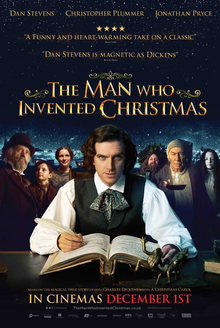Plot
In 1843, four years after the success of Oliver Twist , Charles Dickens (Dan Stevens) is experiencing financial pressures after the failures of his last three books. To restore his finances, he sets out to write a new one, but when his publishers will not meet his target of publication before Christmas, he decides to publish it himself.
Seeing inspiration around London, most notably a rich man's funeral that is largely unattended and a mean-spirited old man who gives him the catchphrase "Humbug" and inspiration of a new character, Charles begins writing A Christmas Carol . It's due in six weeks in order to be published by Christmas, despite his friends and publishers telling him that the book will also be a failure, as Christmas (at the time) was considered irrelevant and few people celebrated it.
As Charles develops the story, he interacts with the characters that he imagines as manifesting in front of him, most notably Ebenezer Scrooge (Christopher Plummer). He is helped by one of his servants, Tara, a literate Irish nursemaid to his children, with whom he discusses story elements.
While writing his book, Charles is greeted by the unannounced arrival of his eccentric father John Dickens (Jonathan Pryce), whom Charles views as immature and fiscally irresponsible. When Charles shows Tara the next draft, she is distraught that Scrooge would not save Tiny Tim (Pearse Kearney). She believes that people can change and suggests instead that Scrooge saves Tiny Tim.
However, Charles finds it difficult to accept that a man as cruel and cold as Scrooge could undergo transformation. He rejects the idea, yet it continues to trouble him, manifesting as writer's block. As he struggles with resolving Scrooge's ending, his relationships with family and friends become increasingly strained, while his debts continue to grow.
Finally Charles sends both his parents and Tara out of the house in a fit of rage. The next morning, he regrets dismissing her, but is unable to find and rehire her. His wife, Catherine Dickens (Morfydd Clark), tearfully confronts Charles over his recklessness and instability, and tells him that she believes that he puts his work before his own family.
It is revealed that much of Charles' animosity toward his father stems from his childhood trauma of laboring in a blacking factory after his family was taken to debtors' prison, all due to John Dickens' failure to pay his debts.
Charles returns to the long-abandoned factory, where he confronts his own insecurities through the figure of Scrooge. Realizing that the story must centre on redemption, he races home to complete the manuscript. As he prepares to deliver it to the printer, Tara arrives to return a book he had lent her; Charles apologizes for his earlier outburst and invites her back into the household.
At his wife's suggestion, Charles also reconciles with his father, who is preparing to leave London. After reuniting with his family, he submits the manuscript in time for publication before Christmas.
The Dickens family celebrates the holiday, and a closing text notes the overnight success of A Christmas Carol and its enduring influence on Christmas traditions.
Production
In addition to filming at Ardmore studios in Wicklow in Ireland, location filming was completed in and around Dublin (including Henrietta Street and North Great Georges Street) as well as in Wicklow; the latter was "transformed into 1840's Victorian England" according to one source. Principal photography was completed on 21 January 2017. [10] [11]
Historical accuracy
In an interview, Stevens said of the film's historical accuracy: "Frankly, whether it's historically accurate, I'm not that concerned about. I was interested in that moment of the creative process, watching a great man struggle – to me, that's dramatically and comedically interesting. Certainly, I was keen not to play Dickens as a bearded old sage." [12] He also expressed an interest in Miriam Margolyes' theory that Dickens was bipolar, saying: "There were moments when he was bleak and depressive. But I think there were moments when he was great fun to be around, very silly and playful." [12]
A Time magazine review mentions that "some major plot points are the product of dramatic license" but concludes that the film "does provide viewers with a fairly accurate sense of how Dickens successfully changed the way Christmas is celebrated". [13]
Dickens is shown visiting Warren's Blacking Factory as an adult, but this building was demolished in the early 1830s. [14]

